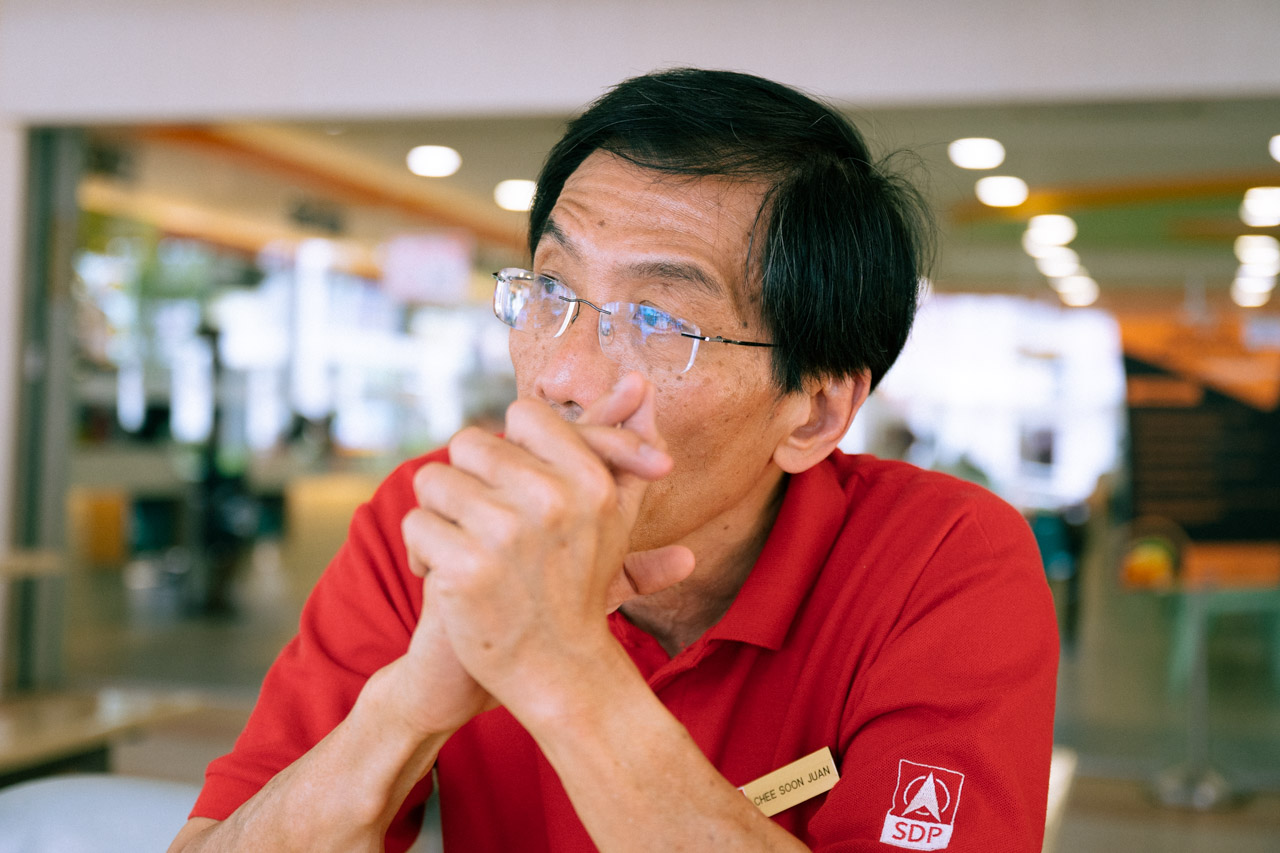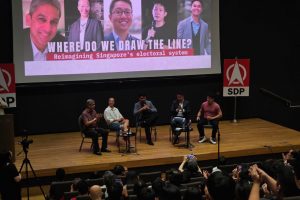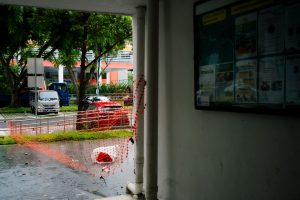RICE does not endorse any political party in Singapore. Refer to our GE2025 content coverage policy for details.
All images by Justin Tan for RICE Media.
Chee Soon Juan is a name every Singaporean voter knows.
Dr Chee, the leader of the Singapore Democratic Party (SDP), and one of Singapore’s most recognisable opposition figures, has been the subject of many headlines over his 33-year political career.
Many of them have not been kind. Over the years, the media has painted the firebrand politician as rude, publicity hungry, and a liar.
I find a different man standing before me when we meet at a coffee shop at Woodlands Mart—a short respite from GE2025 campaigning for him.
The Dr Chee I meet is so soft-spoken, I find myself leaning forward to pick out his words amid the coffee shop cacophony around us. Perhaps it’s true what the political pundits and podcasts say. The man really has mellowed over the years.
This is, after all, the same man who infamously confronted then-Prime Minister Goh Chok Tong in a hawker centre. He accused Goh of loaning S$18 billion to then-Indonesian President Suharto, and demanded an explanation from Goh.
Dr Chee was later sued for defamation by Goh and Lee Kuan Yew, which ended in him losing and filing for bankruptcy. It put his Parliamentary dreams on hold until GE2015, when he lost again. In GE2020, he ran and lost again, but not before receiving a Protection from Online Falsehoods and Manipulation Act (Pofma) direction.
This GE season, though, Dr Chee seems to be staying out of trouble. At 62 (and a successful restaurateur to boot), he’s not as incendiary, but you can’t accuse him of lacking conviction. The cards have always been against him, and this election is no different.
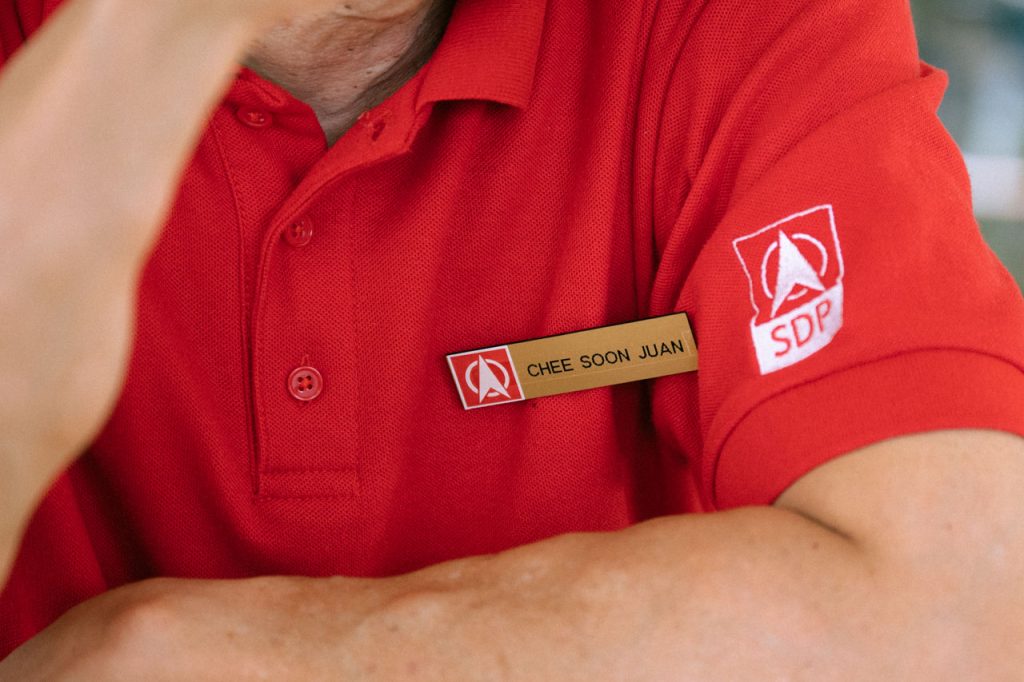
Bukit Batok SMC, where he’s been walking the ground for nine years, and where he contested in GE2020, no longer exists. It’s now part of Jurong East–Bukit Batok GRC. He’s had to start from scratch at Sembawang-West SMC.
The SDP campaign was also dealt another blow when Marsiling-Yew Tee candidate Gigene Wong used a racial slur to describe her teammate, Ariffin Sha, during a rally speech.
She apologised, and Dr Chee took ownership of the incident. But it’s not something voters will forget anytime soon.
And yet, the man soldiers on. He still has hope—that he and his party will one day make it to Parliament, and that the SDP can continue taking Singapore forward long after he’s gone.
Maybe he’s right to hold out hope. Last night (April 30), massive crowds turned up at SDP’s Sembawang rally at the field beside Sun Plaza. And even though rally crowds don’t always translate to votes, it’s still a sign—the people want to hear what SDP has to say.
There’s only so long someone can be the underdog, and after 33 years, you can’t help but feel he’s due a break. And after fighting so hard for a spot in Parliament, could this, just maybe, finally be the year?
In our conversation, he takes a step back to reflect on why, after three decades of uphill battles, he’s not giving up the fight.
How did you feel going into this election?
Everybody was telling me, “Bukit Batok SMC won’t be there anymore.”
I was kind of hoping against hope. But when the Electoral Boundaries Review Committee (EBRC) report came out, my eyes went straight to looking for Bukit Batok SMC. It wasn’t there anymore.
It really felt like a gut punch, and it was difficult. You don’t work on a place for nine years without feeling it when it’s just yanked away from you.
[In Sembawang West SMC] I cannot match the work that I did at Bukit Batok in such a short span of time. I’ve had to compress everything into three weeks [after the EBRC report was released]. But everybody on the ground was very committed. I think it stoked a fire in everybody and hyped us up.
When I announced I was contesting Sembawang-West SMC, volunteers came very early at eight or nine o’clock in the morning. They went out to deliver fliers. And in that one day—one morning, in fact—we covered the entire constituency.
The next thing we had to do was quickly go and do house visits, and knock on doors. And we managed to knock on every single door in this constituency in three weeks. So that was, again, quite a milestone.
The Workers’ Party has steadily been gaining more seats in Parliament. This election, too, they appear to be gaining momentum. Why is it still important for Singapore to have other alternative parties?
Society is so complex—now more so than, say, 50 years ago. Anywhere in the world, not just in Singapore, it’s hard to see things neatly divided in binary form. You’ve got different shades. Even on one issue, you’ve got a spectrum of views. And I think the people are better represented in a multi-party system.
In the UK, it used to be two parties—Tories versus Labour. But now the Lib Dems have come up, the Green Party has come up, and the UK Independence Party too.
To cut a long story short, I do favour the multi-party approach over a binary one. And to add on to that, I think it’s very lacking if we purely stick to a First-Past-The-Post system, because you could have the opposition winning 49 percent of the votes, but theoretically still have 100 percent of seats going to the ruling party. That’s not healthy.
I prefer a mixed, proportional representation system where you have a certain proportion of your Parliament first-past-the-post, like what we have right now—say 50 percent. The other percentage, you put to a vote along party lines. That’s an interesting mix, and it’s worked very well overseas. It’s been adopted in Germany, in South Korea, in Taiwan, and New Zealand.
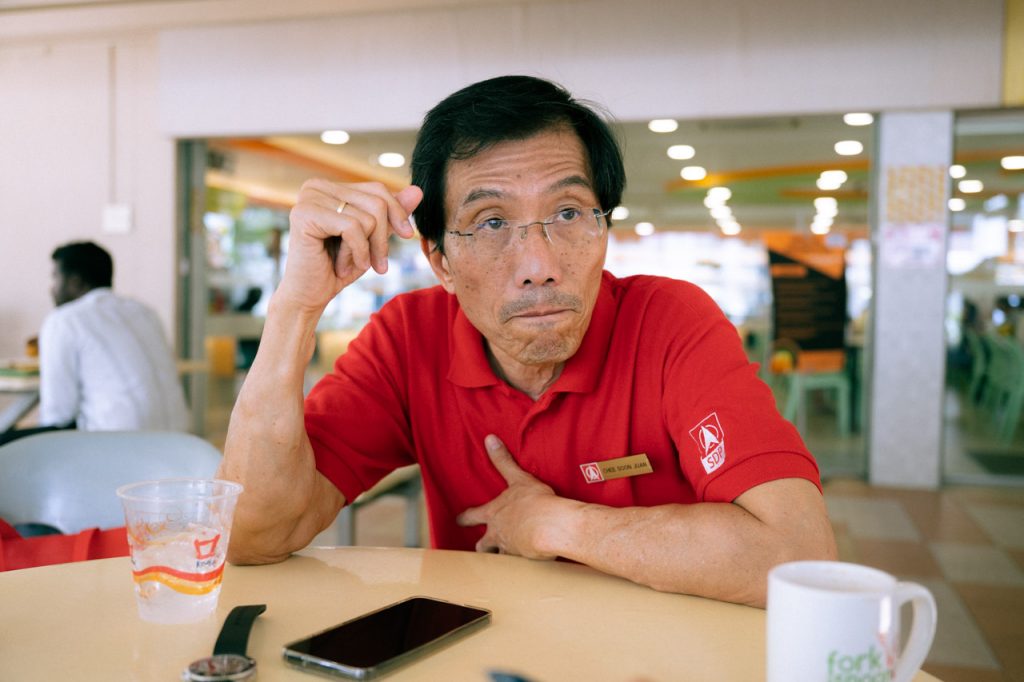
What would getting elected mean to you?
It’s important to get in there and really to push the government to make substantive changes, and reforms. For example, on the topic of education it’s so important for us to reduce class sizes.
My job is only half-done, at least as far as I’m concerned. My whole goal of getting into Parliament is to make sure I yank the PAP and say, “We are facing a huge, huge problem right now. You’ve got to address it. You cannot keep waiting for another five-year term.”
SDP was founded in 1980. What does this legacy mean to you?
With SDP, we’ve come through a very turbulent period. More than any other party we’ve become the ‘lightning rod’ of the People’s Action Party (PAP). And we’ve taken all this time just to stabilise. When I say ‘stabilise’, I mean this in the sense that it has taken all these years for us—decades, in fact—for people to say they really believe in what we’re doing.
During Lee Kuan Yew’s days, he was really gunning for us. And so after his death in 2015, and the previous election in 2020, and now this election, we’re beginning to see change.
I’m just so encouraged. Even though we have very, very limited resources—we don’t have any MPs in Parliament—I am very encouraged by the fact that there were so many young people expressing that they want to join us.
I hope as we continue to grow, people will then begin to know what we are about, and hopefully continue on after we’re long gone. I hope SDP will continue to maintain its vision and take Singapore forward.
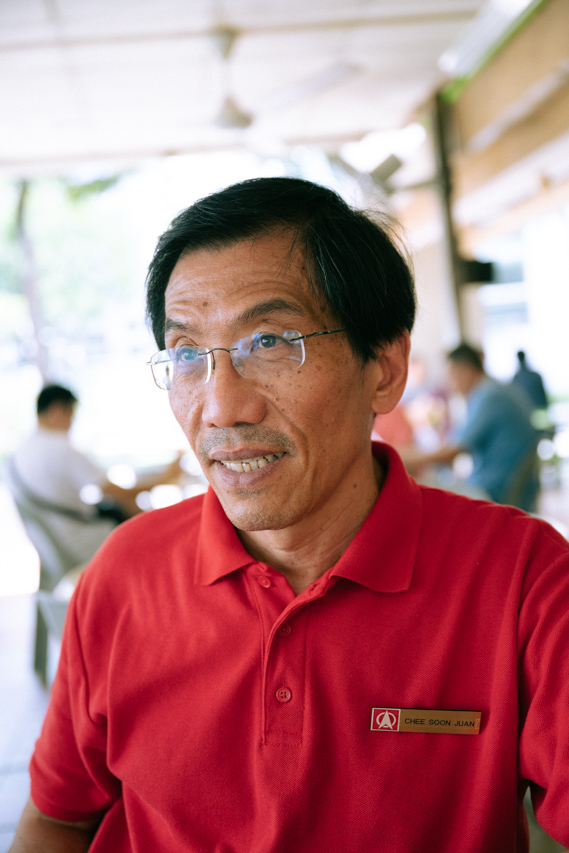
What is this vision? What is SDP really about?
I don’t want to get into the political spectrum of left, right, that kind of thing. I would describe us as ‘the little guy party’. I don’t think that’s too far-fetched.
In any society, the greatness of society is always measured not by the number of billionaires you can attract or you can produce. It’s always by how you take care of the weakest and the poorest. That whole idea of compassion—that’s what a government is for.
It’s sad to say that in Singapore, the government here has got it all terbalik—upside down. They’re all in on business, GLCs, Temasek and so on. And they leave a lot of the taking care of the folks to all the charitable organisations.
Your role as the government is to ensure that you provide a safety net for everyone, so there’s a sense of security.
Look at Finland. For the last decade or so, they have been ranking as the happiest people. And by happy, I don’t mean you go and chug a beer and then go and sing in the pub. No, I mean the other kind of happiness. They feel very secure. They have good networks, a community, healthcare taken care of, friends, and family.
That’s why I see the government’s role as more than just making money. And that’s how I see the vision of SDP— for the little guy.
What happens when the focus is only on making money?
The danger of running the country like a corporation—like Singapore Inc—is that you’re profit-driven. But when your government is profit-oriented, you get what is manifesting today.
Stress is epidemic. 49 percent of SIngaporeans have reported experiencing depression. 27 percent have suicidal ideation and suicidal thoughts.
It’s manifested in Sembawang West. Take a look around. Every block is just surrounding one multi-storey carpark. Each block is facing another block, all in very close proximity. I’ve done my research before. Overcrowding leads to mental health problems, aggressive behaviour, depression, and affects the fertility rate.
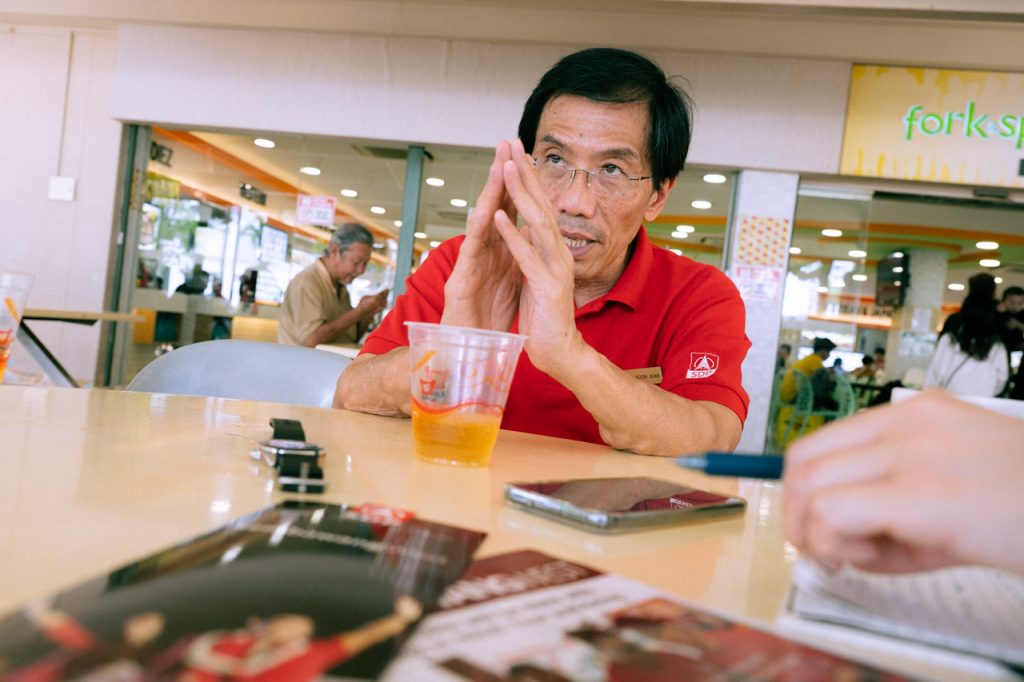
When the government’s priority is to maximise everything in the name of profit, they don’t think in terms of health care or psychological wellbeing.
And hence, SDP’s slogan this election is ‘Thrive, Not Just Survive’. It’s not just a catchy, clever phrase. We don’t just want Singaporeans to survive. We want them to thrive. And thrive, not just in monetary terms, but in every sense of the word—psychologically, health-wise, sports, arts and culture, and music, and have a more well-rounded society.
Has social media made it easier for you to share your ideas?
When you compare the media landscape now to pre-Internet days, the difference is day and night. Before that, it was just a one-way street, and you’re basically at the mercy of Singapore Press Holdings and TCS (as Mediacorp was called then). What they said of you was what they said of you. They would just leap on you and whip you. The vast majority of people couldn’t understand what I was doing. It was a very trying period.
Then, of course, around 2005 or 2006, YouTube came, and Facebook came. That allowed us to record ourselves and just post it online. And since then, if I had a dollar for every time somebody came up to me and said, “I didn’t know you were quite normal. You’re not insane!” I’d be as rich as the Ministers.
It hasn’t been easy for you over the years. But are you still proud to call Singapore home?
I’ve always been proud to call Singapore my home. In fact, my second book was titled Singapore My Home Too. At that time, I wanted to title the book that way because it is my home too.
I’m not going to leave it, and I’m going to fight for it. And if it takes me 30 years to do it, I’ll do it.
I’ve never felt that Singapore was not home. But sometimes people ask: “What is home?”
It’s not the cars, it’s not the buildings, it’s the sights and smells, the people that you see around you, your family, your community, the bonds that you build.
What sort of Singapore do you—and SDP—want to build?
I want Singapore to be a vibrant, intelligent, intellectual place, but one that’s tempered by compassion.
If you put a gun to my head and you asked me to choose, I would prefer Singapore to be more like Silicon Valley than Wall Street. A venture capitalist was telling me that in Palo Alto, where he is based, when people get together, they talk about how to solve problems—not just for the community but huge problems in the world like climate change. But when Singaporeans get together, they talk about HDB prices.
It’s not that it’s not important. But we’ve got huge problems in the world. Maybe it’s the utopianist in me, but I believe we can develop. We have the capability for development.
But that’s the nerd in me talking again. Maybe one of these days we’ll get there.

